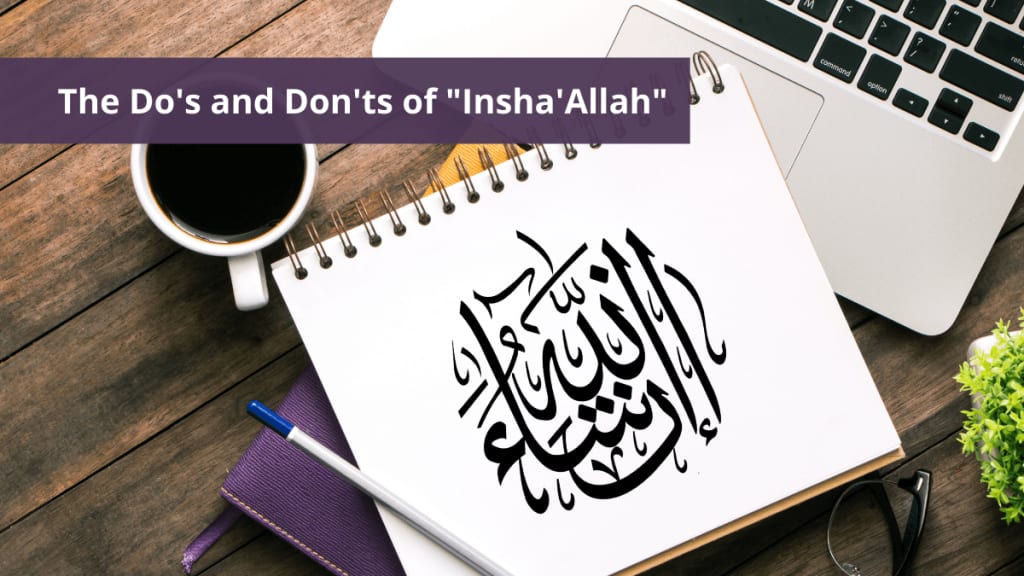What Does Inshallah Mean?
Inshallah is a commonly used Arabic phrase that is frequently heard in Muslim communities around the world. The phrase is often used as an expression of hope or faith, and can be translated to mean "God willing" or "if God wills it."

Inshallah is a commonly used Arabic phrase that is frequently heard in Muslim communities around the world. The phrase is often used as an expression of hope or faith, and can be translated to mean "God willing" or "if God wills it."
For Muslims, the phrase is an important reminder of their faith in Allah, the Arabic word for God. It serves as a reminder that everything happens according to Allah's will, and that all things are ultimately under his control.
In this blog post, we will explore the Do's and Don'ts of "Insha'Allah"
Dos:
Use Inshallah as a statement of faith: Inshallah is a powerful statement of faith and hope. It is a reminder that we trust in Allah's plan and believe that he will guide us in the right direction.
Use Inshallah when making plans: When making plans, it is important to remember that everything is in Allah's hands. Using Inshallah when making plans is a way of acknowledging this fact and seeking Allah's guidance.
Use Inshallah to show respect: In Muslim culture, using Inshallah is a sign of respect. When speaking with elders or those in positions of authority, it is common to use Inshallah as a way of showing respect for their wisdom and experience.
Use Inshallah to express gratitude: When things go well, it is common to express gratitude by saying Alhamdulillah, which means "praise be to Allah." Similarly, when expressing hope or making plans, using Inshallah is a way of expressing gratitude for Allah's guidance and blessings.
Don'ts:
Don't use Inshallah as an excuse: In some cases, Inshallah can be used as an excuse for not following through on commitments. This is not the proper use of the phrase, as it implies a lack of responsibility and accountability.
Don't use Inshallah to avoid difficult conversations: Using Inshallah to avoid difficult conversations is not respectful or honest. It is important to have open and honest communication, even when the conversation may be uncomfortable.
Don't use Inshallah to make promises: Inshallah is not a promise. While we may hope and pray for a certain outcome, we cannot guarantee that it will happen. It is important to be clear and honest when making promises, and not use Inshallah as a substitute.
Don't use Inshallah inappropriately: In some cases, using Inshallah can be seen as inappropriate or disrespectful. For example, using Inshallah in a sarcastic or mocking tone is not respectful to the faith or those who hold it.
In conclusion, Inshallah is a powerful phrase that serves as a reminder of our faith in Allah and his guidance. When used appropriately, it can be a sign of respect, hope, and gratitude. However, it is important to use Inshallah in the proper context and not as an excuse or substitute for honesty and responsibility.
We mentioned earlier how the phrase "insha'Allah" is sometimes being used in a polite or sarcastic manner to mean "no" or "maybe": this should never be done. Saying "insha'Allah" is a commandment from Allah SWT, and, as such, we should never minimize it, make fun of it, or convey the wrong meaning about it to others.
Additionally, there is one situation where we should not say "insha'Allah": when we make dua (supplication).
Abu Huraira reported Allah's Messenger (ﷺ) as saying: "When one of you makes a supplication (to his Lord) one should not say: O Allah, grant me pardon, if You so like, but one should beg one's (Lord) with a will and full devotion, for there is nothing so great in the eye of Allah which He cannot grant." (Sahih Muslim 2679 a)
When making dua for yourself or for others, be filled with trust in Allah SWT and hope that He SWT will grant what you ask for, and never add "insha'Allah". Instead, you may and should say "if this is better for me then facilitate it for me, and if it is not good for me, then keep it away from me" or something similar.
Remember to say "insha'Allah", do your best, and leave the rest to Allah SWT
When discussing our future hopes, plans, goals, and promises we should never fail to follow it with "insha'Allah". This was a commandment given to us by The Almighty which we must always strive to keep and follow if we want success in this life and in the Hereafter. By keeping Allah SWT at the forefront of our minds, we can feel at peace and have hope that He will always provide what is best for us.
About the Creator
Studio Arabiya
Studio Arabiya is the leading Arabic & Quran institute, specializing in all aspects of teaching Arabic, Quran, and Islamic Studies to all ages and all levels online and abroad.
Enjoyed the story? Support the Creator.
Subscribe for free to receive all their stories in your feed. You could also pledge your support or give them a one-off tip, letting them know you appreciate their work.






Comments
There are no comments for this story
Be the first to respond and start the conversation.